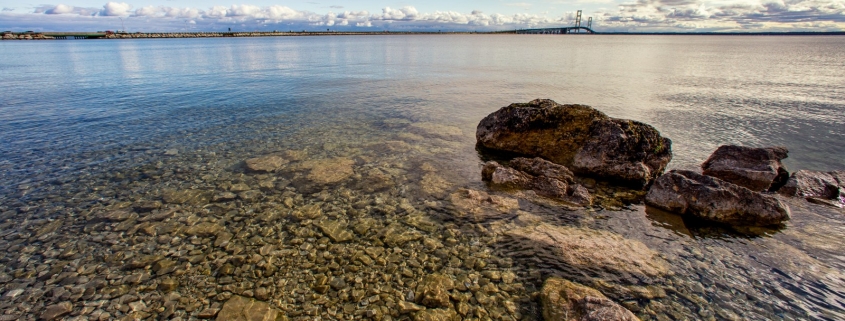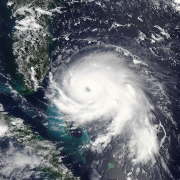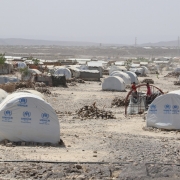Michigan Governor Whitmer Orders Enbridge Line 5 Shutdown, Citing Easement Violations

Enbridge Line 5, the controversial pipeline, carries oil and gas under the Straits of Mackinac, which connect Lake Michigan and Lake Huron. © J. Carl Ganter / Circle of Blue
By Kelly House, Jonathan Oosting, Bridge Michigan
Following a state review that found the Line 5 petroleum pipeline is putting the Great Lakes at risk, Michigan has ordered Canadian petroleum company Enbridge Energy to shut down the pipeline that runs through the Straits of Mackinac by May.
The announcement came following a long-awaited review of Enbridge’s compliance with a 1953 state easement that allows Enbridge to operate its pipeline in the Straits.
A state press release Friday said Enbridge has committed “persistent and incurable” easement violations, prompting Gov. Gretchen Whitmer to notify Enbridge it must stop operating the dual-span pipeline in the Straits by May. Separately, Michigan Attorney General Dana Nessel has filed a lawsuit asking the Ingham County Circuit Court to terminate the easement.
Enbridge did not immediately respond to a request for comment.
State officials found that the easement violates the public trust doctrine, and the oil spill risk associated with continuing to operate the pipelines “cannot be reconciled with the public’s right in the Great Lakes and the state’s duty to protect them.”
The release cited recent anchor strikes that damaged Line 5 as evidence of the risk, along with concerns that the pipeline has “structural problems.”
Nessel’s lawsuit seeks a declaration that the state properly revoked the easement and an injunction reinforcing the state’s order to shut Line 5 down within 180 days and then permanently decommission the pipeline.
Among additional violations, the state alleges: Enbridge has ignored pipeline support requirements “for virtually the entire time the Easement has been in place,” allowing parts of the pipeline more than 75 feet in length to hang unsupported by either the lakebed or an artificial support structure. Enbridge also has failed ensure the pipeline is properly coated, at times resulting in “bare metal” that was not immediately fixed. The state also alleges that bends in the pipe raise concerns about its structural integrity.
These issues cannot be corrected, the state alleges, and thus a shutdown is the only remedy.
The 67-year-old pipeline, which transports up to 540,000 barrels daily of crude oil and natural gas from Wisconsin to Ontario through the Straits of Mackinac, has been a political flashpoint for years because of concerns that it may cause a catastrophic oil spill in the Straits.
Public concern about its safety emerged in the wake of the 2010 Kalamazoo River Oil spill, in which a rupture on another Enbridge-owned line sent more than 840,000 gallons of crude oil streaming into the Kalamazoo River.
In the wake of the disaster, environmentalists began to raise questions about Line 5, another aging Enbridge-owned line that lies exposed at the bottom of the Straits.
Repeated anchor strikes along the line heightened concerns about the pipeline, prompting an agreement under then-Gov. Rick Snyder’s administration that granted Enbridge permission to replace the lake bottom segment with a new pipe encased in a tunnel deep beneath the lake bottom. That in turn produced more litigation over the company’s plan to construct the tunnel.
Enbridge opponents, who had long pressured Whitmer to revoke the easement, met Friday’s announcement with cheers.
“It has been a long time coming,” said Beth Wallace, a Great Lakes partnerships manager with the National Wildlife Federation.
“We clearly cannot continue to wait up to a decade for an alternative that could possibly fall on its face at any point,” Wallace said. “This is what has needed to happen, ever since the first anchor strike occurred.”
Liz Kirkwood, executive director of the water nonprofit For Love of Water, called the news “historic” but warned that the pipeline continues to pose a spill risk.
“We must remain vigilant until the oil stops flowing for good in May 2021 because Line 5 remains exposed to uncontrollable and powerful forces, including exceptionally strong currents, lakebed scouring, new anchor and cable strikes, and corrosion,” Kirkwood said. “These forces dramatically increase the risk of this elevated, outdated pipeline collapsing and causing the unthinkable: a catastrophic oil spill in the heart of the Great Lakes.”
Whitmer campaigned for office in part on a promise to shut down Line 5, but had signaled no concrete plans to do so since taking office. However, the state’s relationship with Enbridge has grown increasingly strained in recent months, following Enbridge’s refusal to cooperate with state officials following an announcement in June that the pipeline had sustained “significant damage” from what appeared to be an anchor strike.
In the wake of the incident, Enbridge briefly shut down the pipeline, then resumed operations on one of the line’s two legs without first seeking permission from the state. The company claimed it didn’t need state permission because it answers to the federal government, not the state.
That prompted Nessel to obtain a restraining order that partially shut down the pipeline for months. The order was connected to a broader suit in which Nessel seeks to void the 1953 easement.
Wallace predicted Enbridge will fight Friday’s decision “in every way they can.”
Sen. Wayne Schmidt, R-Traverse City, said someone from Whitmer’s office alerted him to the move just minutes before it was announced by press release. He called the news a “political stunt” that he doubts it will be successful.
“If this was truly something that would have worked, they would have done it last year,” Schmidt said. “I think this is, again, another Hail Mary distraction from working on not just the COVID pandemic response, but working with the Legislature on a variety of other policy fronts.”
It’s unclear what the shutdown announcement could mean for Enbridge’s tunnel plan — a project that, itself, is mired in legal uncertainty.
Enbridge has applied for state and federal permits to build the tunnel, and the Michigan Public Service Commission is weighing whether to let the company move the pipeline inside the tunnel, should it be built.
Enbridge has repeatedly said it hopes to begin tunnel construction next year and finish building the tunnel by 2024, but that timeline has become increasingly unrealistic given the myriad hurdles the company must clear before breaking ground.
Enbridge has frequently countered calls to shut down the pipeline with dire predictions that a shutdown would strand Upper Peninsula residents who heat their homes with propane from Line 5 and imperil regional refineries that use oil from the pipeline.
Schmidt, whose senate district stretches from Traverse City in lower northern Michigan to Sault Ste. Marie in the Upper Peninsula, shares those concerns.
So does state Rep. Beau LaFave, R-Iron Mountain and a frequent Whitmer critic. He said U.P. propane prices “will increase by four to six times” if the revocation sticks.
“The vast majority (of residents) can afford to heat their homes right now, but if the governor wins — which I don’t think she will — they’re going to be reliant on the government instead of themselves, and that’s not how we want to operate up here.”
Concerns over the potential impact of a Line 5 shutdown prompted Whitmer last year to form a task force charged with identifying alternative modes of getting propane to the Upper Peninsula. The task force offered 14 recommendations, such as exploring options for increasing propane storage in Michigan and expanding rail transport options.
Eric Pardini, director of Public Sector Consultants who led a study that helped the task force form its conclusions, said the state’s decision to time the shutdown for next spring mitigates concerns about a disruption in propane supply.
May is the end of the winter heating season, he said, so suppliers and distributors will have months to find alternative transportation modes before propane demand spikes in the fall.
“It seems like there was some careful thought about how we do this in a timeframe that allows us to prepare,” Pardini said.
Pardini’s study concluded that all alternative means of meeting the UP’s propane needs, such as rail transport, would likely cost more money than Line 5. But in many cases it was “close to cost parity,” he said.
Less certain, he said, is whether it’s possible to shift to other delivery means in a short time frame. It’s also unclear whether such a shift would lead to “market disruptions” elsewhere in Michigan, he said.
The task force did not consider the economic impacts of a shutdown on the region’s oil industry. Pardini said he has fielded concerns from Southeast Michigan and Ohio oil refiners who process Line 5 petroleum into jet fuel for airports in Detroit and elsewhere.
Schmidt said Michigan should hold Enbridge accountable for any safety failures to make sure the company is operating Line 5 in a safe manner, but “we can’t go back to the days of putting it all on barges and tankers and tracker trailers and rail cars. Pipelines have been shown to be the safest way to go.”
Line 5 opponents contend that decommissioning the pipeline will also create jobs tied to removing the pipeline from the water. And the pipeline’s continued operation imperils “millions” of jobs that depend upon the Great Lakes, Wallace said.
“It really isn’t comparable, in my mind,” she said.
The Great Lakes News Collaborative includes Bridge Michigan; Circle of Blue; Great Lakes Now at Detroit Public Television; and Michigan Radio, Michigan’s NPR News Leader; who work together to bring audiences news and information about the impact of climate change, pollution, and aging infrastructure on the Great Lakes and drinking water. This independent journalism is supported by the Charles Stewart Mott Foundation.










Leave a Reply
Want to join the discussion?Feel free to contribute!